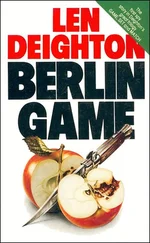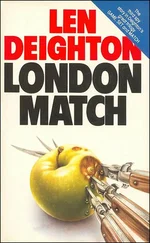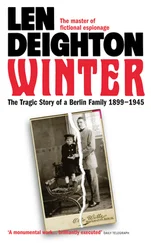Len Deighton - XPD
Здесь есть возможность читать онлайн «Len Deighton - XPD» — ознакомительный отрывок электронной книги совершенно бесплатно, а после прочтения отрывка купить полную версию. В некоторых случаях можно слушать аудио, скачать через торрент в формате fb2 и присутствует краткое содержание. Жанр: Триллер, на английском языке. Описание произведения, (предисловие) а так же отзывы посетителей доступны на портале библиотеки ЛибКат.
- Название:XPD
- Автор:
- Жанр:
- Год:неизвестен
- ISBN:нет данных
- Рейтинг книги:4 / 5. Голосов: 1
-
Избранное:Добавить в избранное
- Отзывы:
-
Ваша оценка:
- 80
- 1
- 2
- 3
- 4
- 5
XPD: краткое содержание, описание и аннотация
Предлагаем к чтению аннотацию, описание, краткое содержание или предисловие (зависит от того, что написал сам автор книги «XPD»). Если вы не нашли необходимую информацию о книге — напишите в комментариях, мы постараемся отыскать её.
XPD — читать онлайн ознакомительный отрывок
Ниже представлен текст книги, разбитый по страницам. Система сохранения места последней прочитанной страницы, позволяет с удобством читать онлайн бесплатно книгу «XPD», без необходимости каждый раз заново искать на чём Вы остановились. Поставьте закладку, и сможете в любой момент перейти на страницу, на которой закончили чтение.
Интервал:
Закладка:
Shumuk put on his spectacles, got up and looked out of the window. Across the street the COMECON annex building was in the course of construction; work continued all round the clock-when darkness came, the construction workers toiled under floodlights. Many of the labourers were women. A line of people waiting for a bus were watching a brawny peasant woman mixing cement. There were long bus lines. A militiaman and some Young Pioneers in their green uniforms were waiting for the special bus that would take them down the Minsk Highway to the battlefield of Borodino. It was a necessary pilgrimage for all the party faithful. Here they would see the place where the might of Napoleon was broken, and where in a later war the Soviet Guards halted the Nazis and stood outnumbered for five long days and nights. Borodino never failed to inspire new faith in the onlookers. Perhaps Shumuk now needed such an infusion of fervour to help him endure the machinations of his colleagues in the Political Bureau. There was little doubt that they had prepared their enthusiastic report about the propaganda value of the Hitler Minutes as a way of putting Shumuk on the spot. Now there were memos, reports and inquiries coming every day, some of them from the Central Secretariat. All could be summarized as ‘How much longer?’ Shumuk sighed. It was time, he reluctantly decided, for drastic action.
Essentially, Parker must be brought out of danger-that was the code of Moscow Centre. None of its professional Russian-born agents were ever abandoned to their fate. It was imbecilic of Parker to involve himself with the man who had committed the murders in Los Angeles and London, but that did not change matters. On the contrary, it made it even more vital to get Parker home for, if he was taken into custody by the Americans, he would be facing charges of first-degree murder.
And yet to pull Parker out would mean that Grechko would come back to Moscow with his reputation unimpaired. Grechko would be able to blame the collapse of Task Pogoni on Moscow ’s decision to move Parker. Knowing the way that Grechko could always muster support and sympathy from certain highly placed enemies of Shumuk’s, one could easily envisage Shumuk himself being blamed for the failure of Task Pogoni. That was something he was determined to avoid.
Shumuk always kept a pair of high-powered binoculars on his windowsill. He found it interesting and instructive to study the people in the streets below. The Red Square bus arrived, and the line of passengers began to board. There was not enough room for everyone. One woman stepped out to hail a passing taxi and a man in a bright blue woollen hat shouted angrily at the bus driver as the bus pulled away. It was unseemly and un-Russian, and the others, although equally angry, turned away to pretend it had not happened. But after the bus had gone the anger of those left behind abated. Shoulders hunched, they turned their backs against the wind and watched the big blonde girl mixing cement. Shumuk put his binoculars down. The bus for Borodino still had not arrived.
Shumuk touched the Washington telex decode with the tips of his bony fingers. He could almost feel it: a lifetime of intelligence work-devious tricks and complex lies, half-truths and betrayals-had given him an instinct that seldom faltered. The Kleiber business was all part of some CIA trick and he would have no part of it. He sat down at his desk and scribbled a message for his Washington KGB office on the special encoding pad, laboriously writing one block capital letter in each grey, printed square so that the cipher clerk could insert the coded message into the empty spaces below each line.
PARA ONE CONFIRMATION MOSCOW CENTRE PERMISSION GRANTED
FOR 982 MEETING STOP LOCATION YOUR PARA EIGHT
MESSAGE NUMBER 907372-KLT TIMING 22 00 HOURS TWENTY
FIRST AUGUST STOP PROCEED CAUTIOUSLY STOP
COMMUNICATE RESULT IMMEDIATE STOP CEASE ALL CONTACT
WITH 907 [Parker’s submission numeral] REPEAT CEASE ALL CONTACT
907 WITH EFFECT IMMEDIATE STOP END PARA END
MESSAGE MOSCOW CENTRE
Shumuk finished pencilling the message and smoothed it on his desk to read it through again. Perhaps this development was a blessing in disguise. This go-ahead for Grechko might provide a chance to end Grechko’s blundering career. Shumuk read the message again. ‘Proceed cautiously’-that got him off the hook but forced Grechko to attend the clandestine meeting. If that meeting was a CIA trap, then Grechko would be totally compromised by the western intelligence agencies. That would certainly mean the end of Grechko’s chances of a seat on any of the directorate committees.
There was another aspect of the present situation which gave Shumuk comfort. If the Kleiber-Grechko meeting on August 21 was a CIA trap, the Americans would be most careful not to alert the KGB to impending danger. They would certainly not move against Parker until their trap closed. That would provide Shumuk with time to get Parker home to Moscow. He pursed his lips and nodded to himself. Such a scenario would give him a triumph with Parker at the very moment when Grechko fell prey to the CIA. He smiled. After all, Parker was the most important factor; Grechko-whatever mess he made of things-could rely upon his diplomatic immunity. Shumuk imagined himself explaining this modestly to a committee of inquiry, shortly before they commended him for his brilliance.
As Shumuk pressed the button to call the cipher clerk, another thought came to him. Why not make certain that the Grechko meeting with Kleiber was a fiasco? It was no great secret that the British intelligence service were looking for Kleiber, so why not tell them where he was going to be on August 21? He could give details of the meeting to London providing they would make Kleiber XPD. It was safer that way; Kleiber’s indiscretions would embarrass both London and Moscow.
At first the notion was no more than something to toy with; like a pain that can be activated by the careful movement of a loose tooth. But within half an hour Shumuk had learnt to live with such a notion. Rationalization being man’s only natural genius, it was not long before he was able to convince himself that revealing Kleiber’s expected whereabouts to the British was the method whereby he could embarrass the CIA.
He picked up his binoculars and nodded to himself. The bus for Borodino had arrived; it was mud spattered and dented. As he watched, the doors hissed open and the uniformed young men filed into it. One boy used his hat to clean a patch of window.
47
Jennifer Ryden’s priorities were hard to comprehend, thought Boyd Stuart. She had insisted that she must see him urgently but now, in a couturier’s in Sloane Street, she seemed to be little interested in anything but the dress she needed for a weekend party.
‘Thank God you weren’t in California.’ Her voice came through the red velvet curtain of the changing booth
‘Why?’ said Boyd Stuart. He was sitting on a small gilded chair, watching himself reflected in the full-length mirrors.
‘Darling!’ said Jennifer Ryden, who was able to imbue this word with any one of a thousand meanings. ‘Dar-Ling!’ It was the mother speaking to the small child, or the film star assailed by fanclub secretaries. Her head came out of the curtains, while her hands grasped the cloth tight against her neck in decorous precision. ‘Because you finally found all my treasures.’
‘They were in the steamer trunk.’
‘Thank goodness.’ Her head went back inside the booth. ‘Let me have the pink dress again,’ she called to the salesgirl.
‘You put them there, Jennifer. You said leave it in the box room and don’t touch it,’ said Boyd Stuart to the curtain.
‘But you opened it.’ The salesgirl passed the long pink dress through the curtains.
Читать дальшеИнтервал:
Закладка:
Похожие книги на «XPD»
Представляем Вашему вниманию похожие книги на «XPD» списком для выбора. Мы отобрали схожую по названию и смыслу литературу в надежде предоставить читателям больше вариантов отыскать новые, интересные, ещё непрочитанные произведения.
Обсуждение, отзывы о книге «XPD» и просто собственные мнения читателей. Оставьте ваши комментарии, напишите, что Вы думаете о произведении, его смысле или главных героях. Укажите что конкретно понравилось, а что нет, и почему Вы так считаете.












